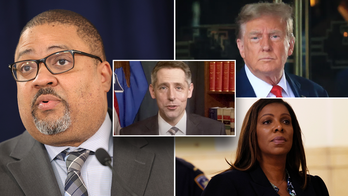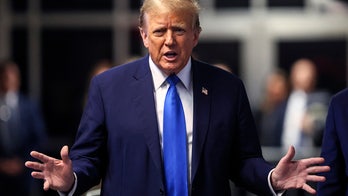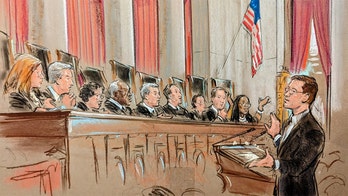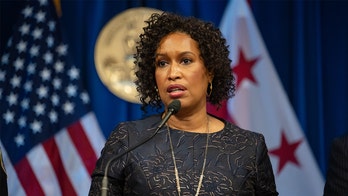Corzine Denies Knowledge of Missing MF Global Funds
Former CEO testifies at congressional hearing on failed investment firm
Former New Jersey senator and governor Jon Corzine insisted Thursday that he has no idea what happened to an estimated $1.2 billion in missing client funds from failed investment firm MF Global, describing the firm's final days as a "chaotic" frenzy of transactions.
"There were many, many, many more transactions than typically occur," Corzine said, in rare testimony before Congress that marked his first public remarks on the firm's bankruptcy since he resigned as CEO on Nov. 3.
Corzine argued that he inherited a firm doomed by his predecessors' bad financial decisions. Yet Corzine said he accepts responsibility for the firm's risky bets and said its customers' losses weigh on his mind "every day, every hour."
Testifying before a hearing of the House Agriculture Committee, Corzine apologized to "all those affected" by MF Global's failure.
"I apologize both personally and on behalf of the company to our customers, our employees, our investors," Corzine said. "I truly know they are bearing the brunt of the impact of the firm's bankruptcy."
Corzine, though, explained that so many transactions were being conducted in the final days as to make it difficult to know whether "operational errors" were made -- or whether entities held onto money that should have been returned to MF Global.
"I simply do not know where the money is, or why the accounts have not been reconciled to date," Corzine's said.
The company filed for bankruptcy protection on Oct. 31 after making disastrous bets on European government debt. The collapse was the eighth-largest bankruptcy in U.S. history.
James Kobak, an attorney for the MF Global bankruptcy trustee, also said in prepared testimony that the firm is "fully committed" to returning customer funds as quickly as possible.
Thursday's hearing marked first time in more than 100 years that Congress has subpoenaed a former senator to testify, according to Senate historian Don Ritchie.
Before Congress, Corzine defended his tenure at the firm. He said MF Global toppled, in part, because of a large quarterly loss caused by his predecessors' accounting moves. Rating agencies responded to the loss by downgrading the firm's credit rating, which panicked investors and trading partners.
He said he made the high-stakes bets only after discussions with company executives who traded European debt long before he arrived. And he said that he reduced MF Global's investment risks by some measures.
Some outside experts challenged that assertion.
Janet Tavakoli, an expert on the transactions MF Global specialized in, said Corzine's remarks divert attention from the firm's fundamental flaw: It lacked the cash to cover its bets after investors started to fear that a major European nation would default.
"His entire testimony looks like a very skilled way to try to detract from that key issue," said Tavakoli, president of Tavakoli Structured Finance.
Corzine, 64, said many people in his position would invoke their Fifth Amendment right to avoid answering questions at Thursday's hearing. But he said that as a former senator he recognizes the importance of congressional oversight and will try his best to answer the panel's questions.
Corzine, however, left open the possibility that he will decline to answer some questions. He said that since his resignation from MF Global, he hasn't had access to certain information he might need to "reconstruct the events that occurred during the chaotic days and the last hours leading up to the bankruptcy filing."
"Without adequate time and materials to prepare, I may be unable to respond to various questions members might pose," he said.
Attempting to answer questions poses a risk for Corzine. Anything he might say could be used against him in a courtroom should Corzine ever be charged in the case. The FBI and several federal regulators are investigating MF Global.
Lawmakers in both parties may have a lot to ask him. Some have heard from farmers, ranchers and small business owners in their districts who are missing money deposited with the firm.
Agricultural businesses use brokerage firms to help reduce their risks in an industry vulnerable to swings in oil, corn and other commodity prices. But MF Global increased risks by making big bets on European government debt -- bets that proved disastrous.
In his remarks, Corzine disputed media reports that he personally pushed the company to make big, doomed bets on risky European debt using too much borrowed money.
Corzine says the company's revenue was "drying up" when he arrived because of competition from online and high-tech brokerages.
He also notes that the company worked with outside consultants on its strategic plan and internal compliance systems. And he says that much of his compensation was in stock options.
The amount of borrowed money used -- known as leverage -- decreased when he ran the company, he says, and he favored the trades that doomed it only after discussions with MF Global's senior traders.
Corzine notes that the European debt securities are all "at least A-rated." Typically, that means the borrower is unlikely to default.
He makes no mention that Standard & Poor's this week said it might downgrade credit ratings for all of the nations whose bonds MF Global owned.
A Democrat, Corzine represented New Jersey in the Senate from 2001 through 2005. He later served as the state's governor. Before entering politics, he was CEO of Goldman Sachs from 1994 to 1999.
Several class-action lawsuits on behalf of shareholders have been filed against Corzine and three other top executives. A bankruptcy court is consolidating the suits. They accuse the firm and its leaders of making false statements about MF Global's strength and cash balances.
The Associated Press contributed to this report.





